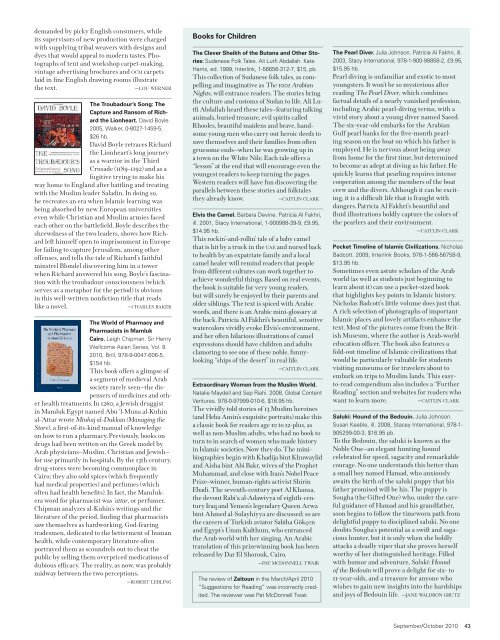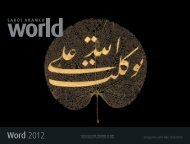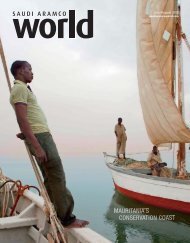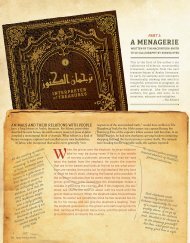ArabicintheSky - Saudi Aramco World
ArabicintheSky - Saudi Aramco World
ArabicintheSky - Saudi Aramco World
You also want an ePaper? Increase the reach of your titles
YUMPU automatically turns print PDFs into web optimized ePapers that Google loves.
demanded by picky English consumers, while<br />
its supervisors of new production were charged<br />
with supplying tribal weavers with designs and<br />
dyes that would appeal to modern tastes. Photographs<br />
of tent and workshop carpet-making,<br />
vintage advertising brochures and OCM carpets<br />
laid in fine English drawing rooms illustrate<br />
the text.<br />
—LOU WERNER<br />
The Troubadour’s Song: The<br />
Capture and Ransom of Richard<br />
the Lionheart. David Boyle.<br />
2005, Walker, 0-8027-1459-5,<br />
$26 hb.<br />
David Boyle retraces Richard<br />
the Lionheart’s long journey<br />
as a warrior in the Third<br />
Crusade (1189–1192) and as a<br />
fugitive trying to make his<br />
way home to England after battling and treating<br />
with the Muslim leader Saladin. In doing so,<br />
he recreates an era when Islamic learning was<br />
being absorbed by new European universities<br />
even while Christian and Muslim armies faced<br />
each other on the battlefield. Boyle describes the<br />
shrewdness of the two leaders, shows how Richard<br />
left himself open to imprisonment in Europe<br />
for failing to capture Jerusalem, among other<br />
offenses, and tells the tale of Richard’s faithful<br />
minstrel Blondel discovering him in a tower<br />
when Richard answered his song. Boyle’s fascination<br />
with the troubadour consciousness (which<br />
serves as a metaphor for the period) is obvious<br />
in this well-written nonfiction title that reads<br />
like a novel.<br />
—CHARLES BAKER<br />
The <strong>World</strong> of Pharmacy and<br />
Pharmacists in Mamluk<br />
Cairo. Leigh Chipman. Sir Henry<br />
Wellcome Asian Series, Vol. 8.<br />
2010, Brill, 978-9-0047-606-5,<br />
$154 hb.<br />
This book offers a glimpse of<br />
a segment of medieval Arab<br />
society rarely seen—the dispensers<br />
of medicines and other<br />
health treatments. In 1260, a Jewish druggist<br />
in Mamluk Egypt named Abu ‘l-Muna al-Kuhin<br />
al-‘Attar wrote Minhaj al-Dukkan (Managing the<br />
Store), a first-of-its-kind manual of knowledge<br />
on how to run a pharmacy. Previously, books on<br />
drugs had been written on the Greek model by<br />
Arab physicians—Muslim, Christian and Jewish—<br />
for use primarily in hospitals. By the 13th century,<br />
drug-stores were becoming commonplace in<br />
Cairo; they also sold spices (which frequently<br />
had medical properties) and perfumes (which<br />
often had health benefits). In fact, the Mamlukera<br />
word for pharmacist was ‘attar, or perfumer.<br />
Chipman analyzes al-Kuhin’s writings and the<br />
literature of the period, finding that pharmacists<br />
saw themselves as hardworking, God-fearing<br />
tradesmen, dedicated to the betterment of human<br />
health, while contemporary literature often<br />
portrayed them as scoundrels out to cheat the<br />
public by selling them overpriced medications of<br />
dubious efficacy. The reality, as now, was probably<br />
midway between the two perceptions.<br />
—ROBERT LEBLING<br />
Books for Children<br />
The Clever Sheikh of the Butana and Other Stories:<br />
Sudanese Folk Tales. Ali Lutfi Abdallah. Kate<br />
Harris, ed. 1999, Interlink, 1-56656-312-7, $15, pb.<br />
This collection of Sudanese folk tales, as compelling<br />
and imaginative as The 1001 Arabian<br />
Nights, will entrance readers. The stories bring<br />
the culture and customs of Sudan to life. Ali Lutfi<br />
Abdallah heard these tales—featuring talking<br />
animals, buried treasure, evil spirits called<br />
Rhooles, beautiful maidens and brave, handsome<br />
young men who carry out heroic deeds to<br />
save themselves and their families from often<br />
gruesome ends—when he was growing up in<br />
a town on the White Nile. Each tale offers a<br />
“lesson” at the end that will encourage even the<br />
youngest readers to keep turning the pages.<br />
Western readers will have fun discovering the<br />
parallels between these stories and folktales<br />
they already know.<br />
—CAITLIN CLARK<br />
Elvis the Camel. Barbara Devine. Patricia Al Fakhri,<br />
ill. 2001, Stacy International, 1-900988-39-9, £9.95,<br />
$14.95 hb.<br />
This rockin’-and-rollin’ tale of a baby camel<br />
that is hit by a truck in the UAE and nursed back<br />
to health by an expatriate family and a local<br />
camel healer will remind readers that people<br />
from different cultures can work together to<br />
achieve wonderful things. Based on real events,<br />
the book is suitable for very young readers,<br />
but will surely be enjoyed by their parents and<br />
older siblings. The text is spiced with Arabic<br />
words, and there is an Arabic mini-glossary at<br />
the back. Patricia Al Fakhri’s beautiful, sensitive<br />
watercolors vividly evoke Elvis’s environment,<br />
and her often hilarious illustrations of camel<br />
expressions should have children and adults<br />
clamoring to see one of these noble, funnylooking<br />
“ships of the desert” in real life.<br />
—CAITLIN CLARK<br />
Extraordinary Women from the Muslim <strong>World</strong>.<br />
Natalie Maydell and Sep Riahi. 2008, Global Content<br />
Ventures. 978-0-97999-010-6, $16.95 hb.<br />
The vividly told stories of 13 Muslim heroines<br />
(and Heba Amin’s exquisite portraits) make this<br />
a classic book for readers age 10 to 12-plus, as<br />
well as non-Muslim adults, who had no book to<br />
turn to in search of women who made history<br />
in Islamic societies. Now they do. The minibiographies<br />
begin with Khadija bint Khuwaylid<br />
and Aisha bint Abi Bakr, wives of the Prophet<br />
Muhammad, and close with Iran’s Nobel Peace<br />
Prize–winner, human-rights activist Shirin<br />
Ebadi. The seventh-century poet Al Khansa,<br />
the devout Rabi‘a al-Adawiyya of eighth-century<br />
Iraq and Yemen’s legendary Queen Arwa<br />
bint Ahmed al-Sulayhiyya are discussed; so are<br />
the careers of Turkish aviator Sabiha Gökçen<br />
and Egypt’s Umm Kulthum, who entranced<br />
the Arab world with her singing. An Arabic<br />
translation of this prizewinning book has been<br />
released by Dar El Shorouk, Cairo.<br />
—PAT MCDONNELL TWAIR<br />
The review of Zeitoun in the March/April 2010<br />
“Suggestions for Reading” was incorrectly credited.<br />
The reviewer was Pat McDonnell Twair.<br />
The Pearl Diver. Julia Johnson. Patricia Al Fakhri, ill.<br />
2003, Stacy International, 978-1-900-98858-2, £9.95,<br />
$15.95 hb.<br />
Pearl diving is unfamiliar and exotic to most<br />
youngsters. It won’t be so mysterious after<br />
reading The Pearl Diver, which combines<br />
factual details of a nearly vanished profession,<br />
including Arabic pearl-diving terms, with a<br />
vivid story about a young diver named Saeed.<br />
The six-year-old embarks for the Arabian<br />
Gulf pearl banks for the five-month pearling<br />
season on the boat on which his father is<br />
employed. He is nervous about being away<br />
from home for the first time, but determined<br />
to become as adept at diving as his father. He<br />
quickly learns that pearling requires intense<br />
cooperation among the members of the boat<br />
crew and the divers. Although it can be exciting,<br />
it is a difficult life that is fraught with<br />
dangers. Patricia Al Fakhri’s beautiful and<br />
fluid illustrations boldly capture the colors of<br />
the pearlers and their environment.<br />
—CAITLIN CLARK<br />
Pocket Timeline of Islamic Civilizations. Nicholas<br />
Badcott. 2009, Interlink Books, 978-1-566-56758-9,<br />
$13.95 hb.<br />
Sometimes even astute scholars of the Arab<br />
world (as well as students just beginning to<br />
learn about it) can use a pocket-sized book<br />
that highlights key points in Islamic history.<br />
Nicholas Badcott’s little volume does just that.<br />
A rich selection of photographs of important<br />
Islamic places and lovely artifacts enhance the<br />
text. Most of the pictures come from the British<br />
Museum, where the author is Arab-world<br />
education officer. The book also features a<br />
fold-out timeline of Islamic civilizations that<br />
would be particularly valuable for students<br />
visiting museums or for travelers about to<br />
embark on trips to Muslim lands. This easyto-read<br />
compendium also includes a “Further<br />
Reading” section and websites for readers who<br />
want to learn more.<br />
—CAITLIN CLARK<br />
Saluki: Hound of the Bedouin. Julia Johnson.<br />
Susan Keeble, ill. 2008, Stacey International, 978-1-<br />
905299-00-3, $16.95 pb.<br />
To the Bedouin, the saluki is known as the<br />
Noble One—an elegant hunting hound<br />
celebrated for speed, sagacity and remarkable<br />
courage. No one understands this better than<br />
a small boy named Hamad, who anxiously<br />
awaits the birth of the saluki puppy that his<br />
father promised will be his. The puppy is<br />
Sougha (the Gifted One) who, under the careful<br />
guidance of Hamad and his grandfather,<br />
soon begins to follow the timeworn path from<br />
delightful puppy to disciplined saluki. No one<br />
doubts Sougha’s potential as a swift and sagacious<br />
hunter, but it is only when she boldly<br />
attacks a deadly viper that she proves herself<br />
worthy of her distinguished heritage. Filled<br />
with humor and adventure, Saluki: Hound<br />
of the Bedouin will prove a delight for six- to<br />
11-year-olds, and a treasure for anyone who<br />
wishes to gain new insights into the hardships<br />
and joys of Bedouin life. —JANE WALDRON GRUTZ<br />
September/October 2010 43









